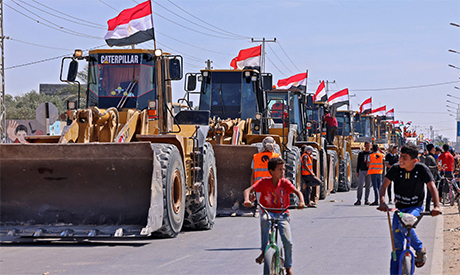
Egyptian reconstruction convoy crosses Rafah border into Gaza
The Gulf countries welcomed Egyptian efforts to start reconstruction in the Gaza Strip after the 11-day conflict with Israel, which left the Palestinian enclave devastated. Last week, Egyptian bulldozers, cranes and trucks moved through the Rafah crossing into Gaza to start clearing a way for rebuilding what Israeli airstrikes destroyed last month.
UN humanitarian workers on the ground say it will take weeks to find out how much money is needed to repair the damage inflicted on thousands of buildings during the May conflict. Gaza’s own Housing Ministry said 1,500 units were destroyed during the fighting, another 1,500 were damaged beyond repair and 17,000 suffered partial damage. Gaza’s water and power infrastructure are also badly damaged. According to the UN, six hospitals and 11 health-care clinics were damaged, and nearly half the Strip’s two million residents lack reliable access to clean water because desalination plants have stopped functioning.
In a recent report, the Washington Post estimated that rebuilding in Gaza might cost billions, not millions, of dollars. So far, the only pledges to contribute to that effort come from Egypt and Qatar, with 500 million dollars each. Many parties are wary of Qatar’s contribution as it is seen as a main supporter of Hamas. The US, the EU, Israel and the rest of Gulf countries are opposed to any aid that might benefit Hamas financially.
As Saudi commentator Abdul-Aziz Alkhames told Al-Ahram Weekly: “Reconstruction with Hamas in control is nonsense. You rebuild, then Hamas launches rockets again and so Israel strikes, demolishing what has been rebuilt. It is a vicious circle.” He said the only way Gulf countries can contribute to reconstruction would be through Egypt.
“If Egyptian intervention meant full control of the rebuilding effort and the weakening of Hamas control it will be a positive move. But empowering Hamas to the benefit of Iran is not acceptable,” Alkhames said. He concluded that “the Gulf countries might contribute to Gaza reconstruction only through Egypt. Complete Egyptian control of the money and rebuilding effort is a good thing.”
Oxford University lecturer Andrew Hammond, who previously worked in Riyadh and Dubai, agrees that if the US is content with Egypt rather than Hamas overseeing the reconstruction, KSA and other Gulf countries might contribute.” He told the Weekly that Egypt “will provide [the US’s Gulf allies] the cover they need… they will judge it according to the US response.”
But Hammond downplays the notion of isolating Hamas by not contributing aid. He said, “If [the Gulf countries] put that concern first and foremost then they would be behaving just like the Israelis. The priority is allowing people to rebuild. If the idea is to prevent Hamas rockets, well… they hardly need millions of dollars to do that. They are homemade, improvised responses to the ghettoisation of Gaza and denial of its residents their basic human rights. In other words the rockets don’t need their money. I doubt that it is their real concern anyway. The real concern is that they [fear they will] be accused by the US government of helping Hamas, not of actually helping Hamas.”
According to the Israeli national broadcaster Kan channel, the Emiratis “offered to help rebuild the Gaza Strip provided Hamas does not intervene in the reconstruction efforts”. It said in a report that “US officials have in recent days visited the UAE to coordinate efforts to rebuild Gaza, but Abu Dhabi conveyed a clear message to Washington that it would provide direct humanitarian support to Gaza, but it would not finance any such mechanism if Hamas has a role in it.” The report, which might be referring to US Secretary of State Antony Blinken’s tour of the region by end of last month, could not be verified independently.
Still, it is a clear fact that any involvement of Hamas in the reconstruction efforts will most likely hinder outside assistance, particularly Gulf contributions. The Brookings Institution’s recent analysis concluded that only about half of aid pledges to Gaza in 2014 were met after the previous clashes with Israel devastated the Strip. The international community then promised 5.4 billion dollars in aid. According to the Brookings analysis, “the majority of unfulfilled promises came from Persian Gulf Arab states that opposed Iranian-allied Hamas and hoped that delays in rebuilding would erode Hamas’s legitimacy in the Strip.”
The lack of a permanent truce between Israel and Hamas has led to what the Brookings Institution termed “donor fatigue”. It added, “A sense of futility took hold over some of the Western donors, as they saw their previous investments go up in the flames of war for the second, and in some cases, third time, making them apprehensive about providing further funding.”
That is the very idea Abdul-Aziz Alkhames stressed in his comments to the Weekly, and it is why Egypt, which brokered the ceasefire last month, is keen to cement the truce. It is also working hard to bring all Palestinian factions to gather in Cairo next week to reach a Palestinian reconciliation that could further strengthen peace efforts.
Whether Egyptian efforts could spark the Gulf to contribute to Gaza’s reconstruction remains to be seen. It requires much effort in the short term and a strong commitment in the long run.
*A version of this article appears in print in the 10 June, 2021 edition of Al-Ahram Weekly
Short link: